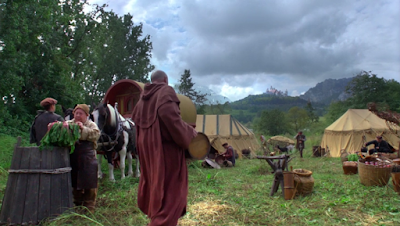Read the previous entry in the series here.
Read the next entry in the series here.
There are stereotypical depictions at work in the episode. Just so y'all know.
1.5, "That Still Small Voice"
Written by Jane Esperson
Directed by Paul A. Edwards
Synopsis
 |
| Something's very meta about this... Image taken from the episode, used for commentary. |
In Storybrooke, Henry confers with his therapist, Archie; Henry asserts that the therapist is Jiminy Cricket and that there are no (other) crickets in the town, expounding on his theories. Archie presses Henry about his motives, urging him to think on them.
Elsewhere, Emma accepts a position as a deputy sheriff, refusing a uniform but reluctantly accepting a badge. An explosion rocks the sheriff's station as she does, and the two rush off to the scene of a cave-in at a local mine; Regina attempts to order Emma off, and the fact of her deputization becomes an issue in short order. Archie and Henry arrive on site as Regina expostulates; Henry rejects the idea, only to be dismissed by Regina as the area is cordoned off. Perhaps expectedly, he sneaks off, summoning Archie and Emma to investigate what he sees as a link between Emma and the collapse. Regina again interjects, angrily, and demands he work against Henry.
 |
| Ain't this a charmingly typical scene? Image taken from the episode, used for commentary. |
Henry arrives for another therapy session and presents his idea for investigating matters further; Archie moves to quash what is described as Henry's emerging psychosis. The boy withdraws in anger, and Archie cries over it.
 |
| Yeah, this's gonna be a problem... Image taken from the episode, used for commentary. |
In the Enchanted Forest, Rumpelstiltskin works a spinning wheel as Jiminy approaches, delivering purloined goods for pay. He intuits Jiminy's desires and offers a deal that will allow him to achieve them. Jiminy accepts the deal, somewhat trepidatiously, and leaves.
In Storybrooke, the search for Henry in the mine begins. Emma and Archie follow Henry as he reconnoiters the old mining tunnels, finding broken glass and triggering more collapse; Archie is trapped in the mine. He finds Henry, who leads him further into the mines.
 |
| Again, my inner Hank Hill... Image taken from the episode, used for commentary. |
Archie finds Henry in the mine again, reiterating their danger as search and rescue efforts continue. Arguments ensure, and Emma and Regina set aside their differences to effect the recovery. Meanwhile, Archie and Henry find an elevator, and preparations are made to blast the mine open. The explosion does not help.
David greets Mary Margaret as she makes to leave, asking her to walk with him a while. She agrees, and they stroll together, her asking him about his memories. He notes the surreality of his situation--except for his interactions with her. Katherine arrives again, interrupting them.
Search and recovery continues, Emma employing Archie's dog to help. They uncover an air shaft, and, in the mine, Henry apologizes for causing trouble. Archie apologizes for his outburst with Henry in his office. The mine continues to shift around them as, above ground, work to clear the air shaft continues. They confer further about Henry's ideas, and Emma makes her way toward them.She extricates them just as the elevator gives way, returning both safely to the surface. Archie, emboldened, confronts Regina--successfully.
In the Enchanted Forest, a mournful Jiminy looks to the heavens in hope and makes a wish--that is granted obliquely, making him into the cricket as which he is known and binding him to Geppetto. And in Storybrooke, the crickets return, Gold stalks through his shop, and Mary Margaret resigns from her work at the hospital. Regina, however, looks into the mine with concern, where a shattered container lies.
Discussion
Once again, the series does poorly in rehashing old prejudicial ideas--not by name, of course, because that might be actionable, but in a coded mixture that makes clear what is being referenced without having to speak the name thereof. In this case, the brightly colored wagons and clothing of the puppeteers and their propensity towards theft and grift call up stereotypes about the Roma/Romani (I've seen both terms used, and I'm not sure which is preferred; I know both are preferable to others) long used to persecute the itinerant people. And there might be some who would argue that reliance on the imagery is, in fact, a nod to historical accuracy--but that would betray a misunderstanding of the historical fact; yes, the prejudicial depictions are historically attested, but the accuracy of those depictions is questionable at best. (I do not think "best" really applies in the present case.) It's another bit of sloppiness on the part of the show's...I'm not sure who, really, is responsible, here, actually; I guess everybody involved is complicit at some level, and I and others who watch/ed the series, prompting its continued existence, bear some blame, as well.
The questions, then, are how do we recognize what is wrong and how do we work to make it right?

No comments:
Post a Comment